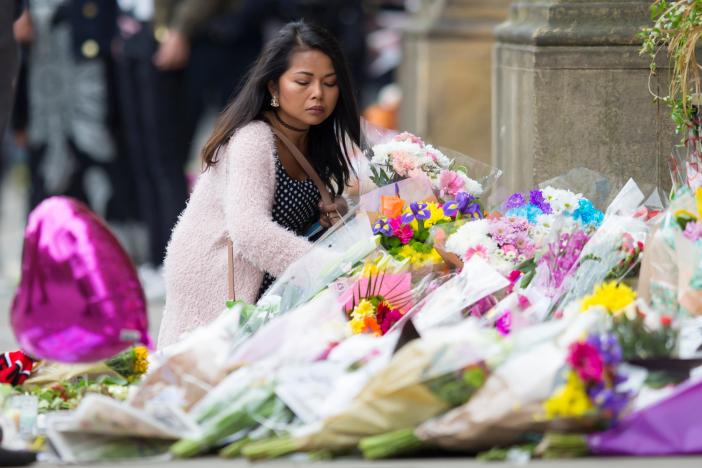Is Jeremy Corbyn right? Does our foreign policy play a role in terrorism?

There are still parents in the early stages of grief. The police cordon remains in place around the Manchester Arena. Arrests are being made.
This is not a time for wild speculation over the events themselves. We need to allow the police and security services to do their job and to find anyone linked to the horrendous loss of life on Monday.
However, today's political debate is about whether Jeremy Corbyn, the Labour Leader, is correct to imply that events such as the Manchester attack are partly the responsibility of British foreign policy.
He said: 'Many experts, including professionals in our intelligence and security services, have pointed out the connections between wars that we have been involved in, or supported, or fought, in other countries and terrorism here at home.'
Corbyn denied that his words reduced the culpability of the terrorists themselves. 'That assessment in no way reduces the guilt of those who attack our children; he said. 'Those terrorists will forever be reviled and implacably held to account for their actions... But an informed understanding of the causes of terrorism is an essential part of an effective response that will protect the security of our people that fights rather than fuels terrorism.'
There are two immediate knee-jerk reactions to this that both seem to be wrong. The first one is to suggest that British/American foreign policy is of course to blame for Manchester and any other attack in the West. Put simply, this perspective places all the blame for attacks at the door of the British and American governments and militaries.
This is far too simplistic. There were terror attacks long before the US and UK got bogged down in Iraq and Afghanistan. The World Trade Centre was first bombed in 1993, 10 years before the US invasion that toppled Saddam Hussein. There are a myriad other examples. Yes, Britain and America have been involved in the Middle East for decades – but it's just too simplistic to suggest that's the only reason for attacks on UK and US soil.
Also, this account takes no notice of terror attacks that have happened elsewhere. Germany was not part of the coalition of countries which attacked Iraq in 2003. Neither was France – in fact the French political establishment was castigated by American supporters of the war. Yet Germany and France have both been hit by severe terrorist atrocities in recent years. Their opposition to recent American and British foreign intervention did not prevent them from being a target.
The second knee-jerk reaction is the idea that terrorists simply hate our freedom and way of life and that's why they attack us. In the aftermath of 9/11 there was an episode of the political TV show The West Wing. It dealt with the issues behind the devastating attack which had taken place only weeks before.
One of the characters, Josh Lyman, sums up why he thinks terrorists attacked Washington and New York. 'So what bothers them about us?' he asks. 'Well, the variety of cheers alone coming from the cheap seats at Giants stadium when they're playing the Cowboys is enough for a jihad, to say nothing of street corners lined church next to synagogue, next to mosque, newspapers that can print anything they want, women who can do anything they want including taking a rocket ship to outer space, vote, and play soccer. This is a plural society. That means we accept more than one idea. It offends them... You want to get these people? I mean, you really want to reach in and kill them where they live? Keep accepting more than one idea. It makes them absolutely crazy.'
There is a lot to commend this opinion. But it doesn't quite stand up to full scrutiny. Japan, Iceland, Brazil and a host of other pluralistic countries don't find themselves the regular target of Islamists. Now, it may be that their security services have foiled numerous attempts that we haven't heard about. Or it may be that the explanation for the terror attacks we suffer is actually multi-faceted.
We cannot, of course, ignore the role of religion in inspiring violence. Again, this must be debated and discussed. Talking about and examining the role of Islam in inspiring Islamists must not be off limits. As Christians, we need to recognise that in the last decades horrendous atrocities have been committed by those claiming Christian identity, in Srebrenica and by the Lord's Resistance Army, for example.
The one thing that must be said loud and clear is that there is no excuse for what happened on Monday in Manchester. Young women and men were callously cut apart. They had committed no crime – they had merely gone to enjoy themselves. Any reasoning that doesn't start with holding the bomber, bomb maker and anyone else in their network fully responsible is defective. There is never an excuse for such wanton violence.
The calm conversation we need to then have a society is how we can think about terror attacks to prevent them in future. Nothing should be off the table in terms of examining the causes of such horrific attacks as the one we saw on Monday. Foreign policy, religion, and much more should be examined for the role it may have played. That does not mean that any old crackpot theory about why attacks happen is valid, merely that to root out terrorism, we have to attempt to understand its causes – not just summon outrage on social media.
Our agenda must be to keep our society safe enough that young people can go to a concert without fear. The people we must have first in our minds as we have this difficult and delicate conversation is the victims and their families, many of whom are still just beginning their terrible journey of grief.











